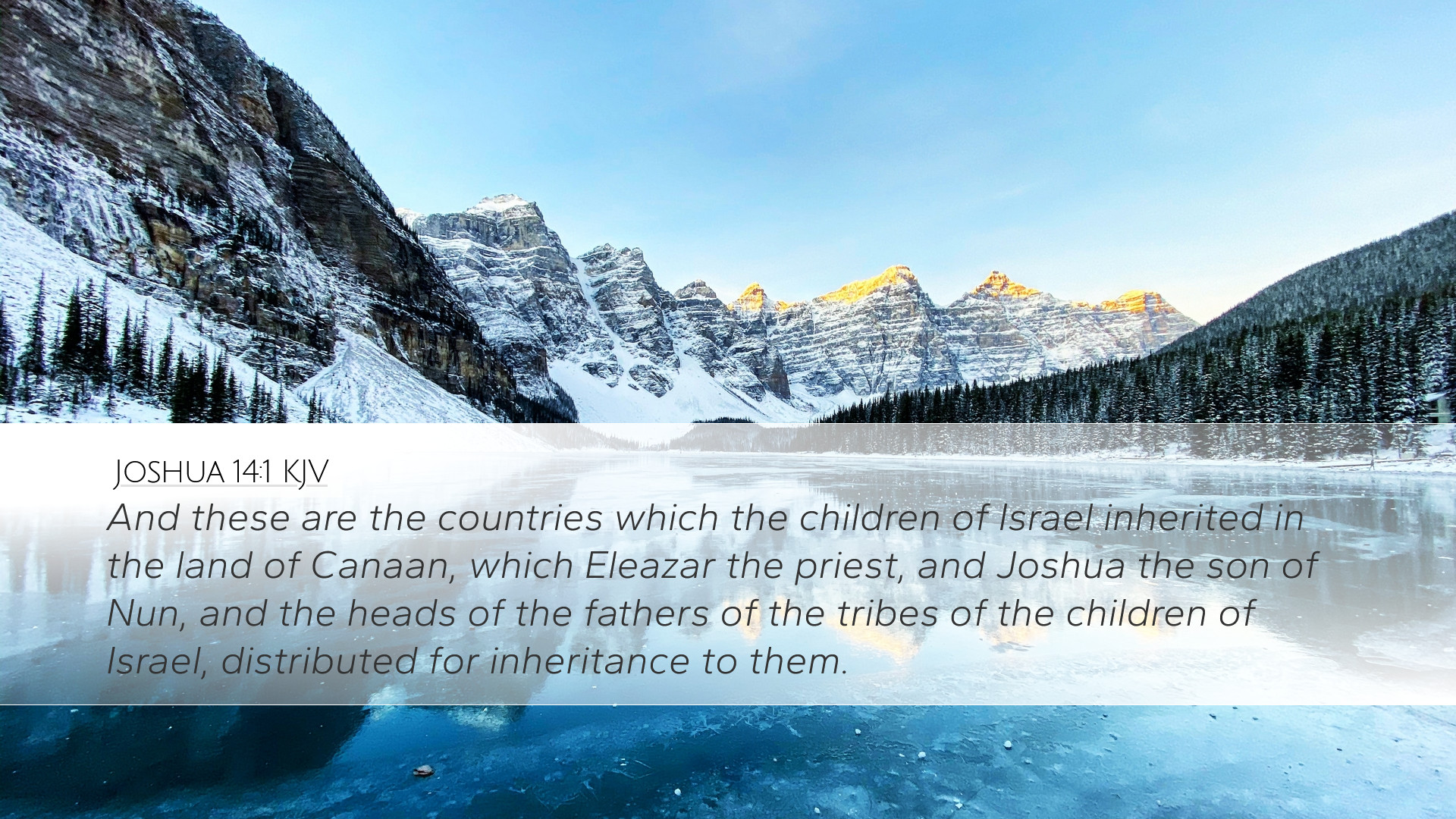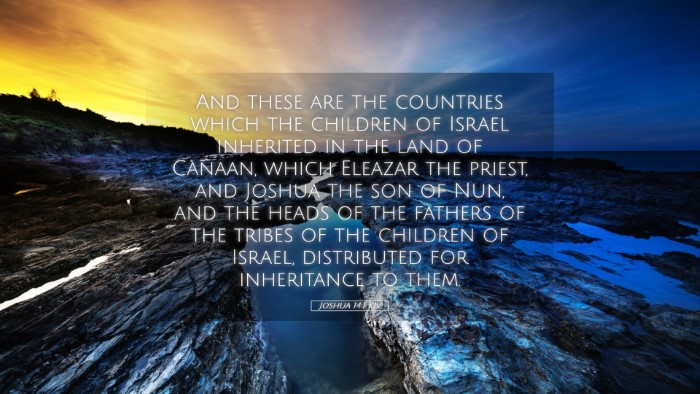Old Testament
Genesis Exodus Leviticus Numbers Deuteronomy Joshua Judges Ruth 1 Samuel 2 Samuel 1 Kings 2 Kings 1 Chronicles 2 Chronicles Ezra Nehemiah Esther Job Psalms Proverbs Ecclesiastes Song of Solomon Isaiah Jeremiah Lamentations Ezekiel Daniel Hosea Joel Amos Obadiah Jonah Micah Nahum Habakkuk Zephaniah Haggai Zechariah MalachiJoshua 14:1
Joshua 14:1 KJV
And these are the countries which the children of Israel inherited in the land of Canaan, which Eleazar the priest, and Joshua the son of Nun, and the heads of the fathers of the tribes of the children of Israel, distributed for inheritance to them.
Joshua 14:1 Bible Commentary
Commentary on Joshua 14:1
Verse: "And these are the countries which the children of Israel inherited in the land of Canaan, which Eleazar the priest, and Joshua the son of Nun, and the heads of the fathers of the tribes of the children of Israel, distributed to them." (Joshua 14:1)
Introduction
This verse serves as a preamble to the allocation of the land of Canaan among the tribes of Israel. It highlights the roles of key leaders, namely Eleazar the priest and Joshua, in the distribution process. This moment marks a significant transition for the Israelites as they begin to claim the promised land. Within the framework of biblical leadership and communal inheritance, we glean profound theological and practical insights from this account.
Contextual Overview
The Book of Joshua narrates the conquest and settlement of Canaan by the Israelites, under Joshua's leadership. Its purpose is to affirm God's faithfulness in fulfilling His promises, demonstrating His sovereignty over nations, and teaching vital lessons about obedience, faith, and inheritance.
Leadership in Land Distribution
1. Divine Authority and Human Agency: The involvement of Eleazar, Joshua, and the tribal leaders indicates a unified leadership that reflected both divine authority and human agency. Issues regarding inheritance were administered responsibly, reflecting the character of God in providing for His people.
2. The Role of Eleazar: Eleazar, as High Priest, signifies the spiritual direction that accompanies Israel's civil affairs. His leadership illustrates that the distribution of land was not merely a political act but a profoundly spiritual one, securing the Lord’s presence and approval in the affairs of His covenant people.
3. Joshua's Leadership: Joshua’s task was monumental, as he stands as a successor to Moses, embodying the transition from wilderness wanderings to settlement in the land. His leadership emphasizes faithfulness and courage, essential qualities for a leader administering God’s promises.
Significance of Land Inheritance
Land inheritance in ancient Israel was deeply symbolic of God’s promise and provision. It represents not just physical territory but spiritual belonging.
- Covenantal Blessing: The land signifies the fulfillment of God’s covenant with Abraham, Isaac, and Jacob, manifesting the tangible blessings that await those who uphold their responsibilities in faith.
- Encouragement of Unity: By involving tribal leaders, Joshua promoted unity among the tribes, essential for collective identity and cooperation as they would face the challenges of possessing the land.
- Equity in Distribution: The methodical arrangement for inheritance underscores fairness and equity in God’s distribution, reflecting His justice.
Theological Reflections
This verse opens a window to several theological reflections that are pertinent for scholars and theologians.
- The Nature of God: The God who promises is the God who provides. The allocation of land illustrates His desire to bless His people abundantly.
- Faith and Obedience: The distribution of land is an allegory for the blessings that arise from faithful obedience to God’s word. The Israelites had to trust in God to fulfill His promises amidst the challenges they faced.
- Inheritance as Hope: The land represents an enduring hope for the Israelites, analogous to the Christian hope of eternal life and the ultimate inheritance awaiting believers in Christ.
Practical Applications for Today
While this verse reflects a historical event, it possesses practical implications for contemporary believers, pastors, and theologians.
- Leadership in God’s Work: Today's leaders are called to act with integrity, reflect divine principles in their actions, and foster unity among believers.
- Faithfulness amidst Trials: Just as the Israelites had to confront formidable challenges, believers today are reminded to cling to faith and trust in God during adversity.
- Community and Inheritance: Understanding the concept of shared inheritance emphasizes the importance of community among believers, encouraging them to work together for the common good and spiritual growth.
Conclusion
Joshua 14:1 serves as a foundational verse for grasping the broader themes of land allocation, leadership, and the faithfulness of God. Through a careful study of this verse in conjunction with the surrounding narrative, believers are encouraged to reflect on God's promises, embrace their identity in Christ, and maintain faithfulness and unity in their communities. The historical context enriches theological understanding and underscores enduring principles applicable across generations.


